Particle Network has solved the problem of managing multiple Gas tokens in a multi-chain ecosystem, making the user experience more consistent and seamless.
By: Cha Guan Xiao Er, Chain Teahouse
Particle Network is a full-stack middleware platform that unifies the storage and trading of assets in different blockchain networks to support various Web3 infrastructure products and services, making Web3 more accessible.
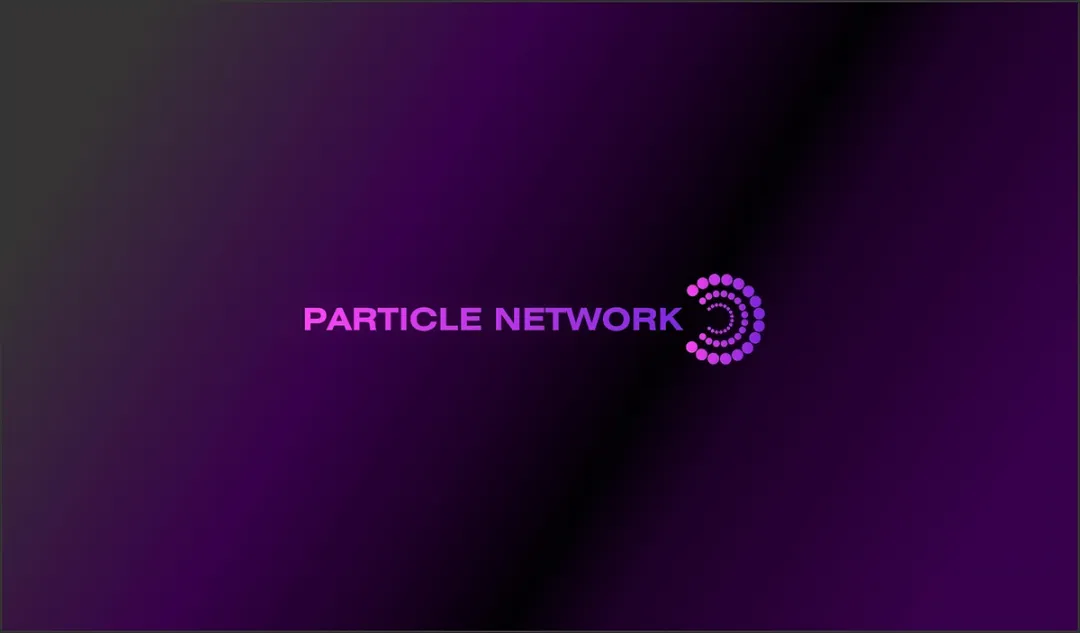
At the end of 2021, when Particle Network was founded, the team realized that the complex Web3 registration process and technical complexity often lead to a poor user experience, which easily discourages new users.
For example, users need a mnemonic phrase to create a wallet, then add traditional browser plugins and third-party wallet redirection, which greatly complicates the user experience and operations. In addition, after creating a wallet, users also need to pay gas fees to use Web3 Dapps, which requires buying coins through OTC and then transferring them back to the wallet. For novice users, this is a significant deterrent.
Therefore, Particle Network developed an authentication and wallet-as-a-service solution, allowing developers to integrate user-friendly Web2 authentication solutions into their DApp development.
1. Operation Principle
Particle Network achieves chain abstraction through its modular L1 blockchain, providing users with cross-chain unified accounts and liquidity management. This design aims to simplify user interaction with the blockchain, making operations in the multi-chain ecosystem more seamless and intuitive for users.
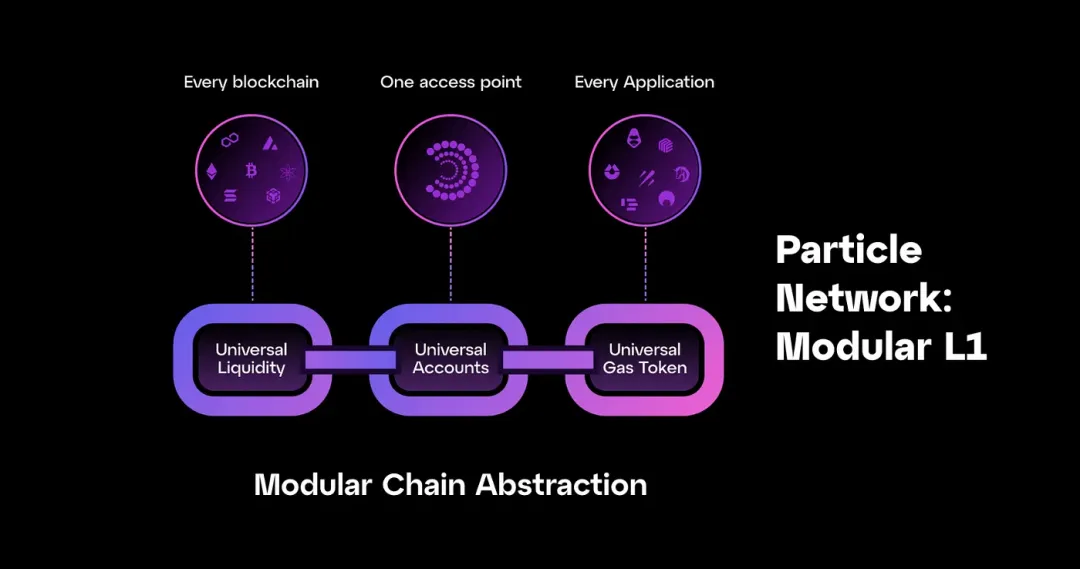
Particle Network has created a unified account that provides users with a single address and interaction point across all chains. This account structure simplifies the management and use of smart contract wallets, supporting both EVM and non-EVM networks, such as Bitcoin and Solana. Users can create and manage these accounts through social login or Web3 wallets, ensuring they can easily operate on different chains.
Particle Network's unified liquidity aggregates liquidity across all chains through optimistic execution of cross-chain atomic transactions and exchanges. This allows users to seamlessly interact with new blockchains, even if they do not hold tokens on the target chain. For example, users can use USDT on different chains to purchase ETH to obtain an NFT on a specific chain, and this process is transparent to users, with all operations automatically completed in the background.
Particle Network allows users to pay gas fees for cross-chain transactions with any token, and all transactions are settled in $PARTI, the native token of Particle Network. This solves the problem of managing multiple Gas tokens in a multi-chain ecosystem, making the user experience more consistent and seamless.
2. Main Services and Products
2.1 Authentication Service
Particle Network provides a new key management and security solution through its multi-party computation (MPC) and threshold signature scheme (TSS) technologies, combined with social login functionality, to simplify and secure the user experience in Web3.
Key Management
- Particle Network's key management follows three core principles: user-exclusive control, secure account recovery, and elimination of single points of failure. Through MPC-TSS technology, sensitive keys and secrets are divided into two parts, stored by two different entities, ensuring that even if one entity is compromised, the key cannot be leaked, thus avoiding single points of failure.
Multi-Party Computation (MPC) and Threshold Signature Scheme (TSS)
- MPC-TSS requires multiple parties to participate in encryption operations throughout the key's lifecycle without combining the two parts of the key, adding an additional layer of security. Key parts are regularly updated without changing the actual key, forcing potential attackers to simultaneously compromise two entities to access key materials.
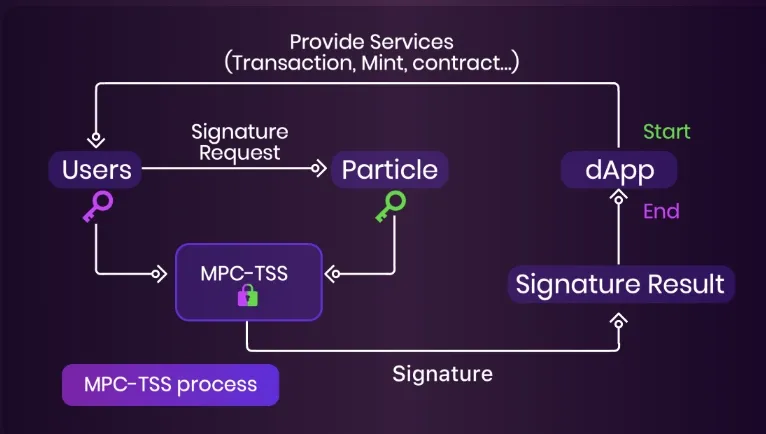
Particle Auth, as a project within the Particle Network ecosystem, supports various authentication methods, including phone numbers, email, Google, Facebook, Twitter, and other social logins, allowing users to choose the most convenient way to log in. The social login feature allows users to access their accounts using familiar authentication methods (such as Google or Facebook login) when creating digital wallets without managing complex key management processes, simplifying the onboarding experience and promoting widespread adoption of cryptocurrencies. Users can manage their key shares through familiar platforms while benefiting from the strong security provided by MPC-TSS.
In addition, users can seamlessly integrate into any web, native mobile app, or game, suitable for various blockchain ecosystems and encryption standards. Particle Network has integrated the functionality of numerous partners, including TRON, Gameta, Biconomy, 1inch, and Ultiverse, supporting Particle Auth to integrate with various types of wallets, platforms, chains, and social media login information.

Particle Network's authentication service effectively reduces the entry barriers of Web3 applications by solving the complexity and triviality of traditional authentication solutions through its comprehensive infrastructure.
2.2 Wallet Service
Particle Network provides an innovative "Wallet-as-a-Service" (WaaS) solution, launching Particle Wallet, which supports users in quickly and easily conducting transactions and token conversions, while also simplifying Web3 application development and enhancing the user experience.
For simplifying the development part, Particle Wallet supports cross-platform compatibility, suitable for desktop, iOS, Android, Flutter, Unity, Unreal, React Native, and other platforms, providing developers with a wide range of choices and flexibility.
Furthermore, Particle Wallet offers highly flexible and customizable solutions, allowing developers to create unique and tailored experiences for users, making their Web 3.0 applications stand out in the competitive market. Developers can adjust the appearance of elements such as email and SMS design, login and verification pages, transaction pages, and configure design elements such as background and button colors, border styles, logos, fonts, and choose between light or dark mode. Additionally, WaaS allows developers to configure platform features according to user needs, such as selecting supported transaction tokens, included chains, highlighting specific tokens or NFTs, displaying prices in default currencies, enabling WalletConnect, and providing multilingual support.
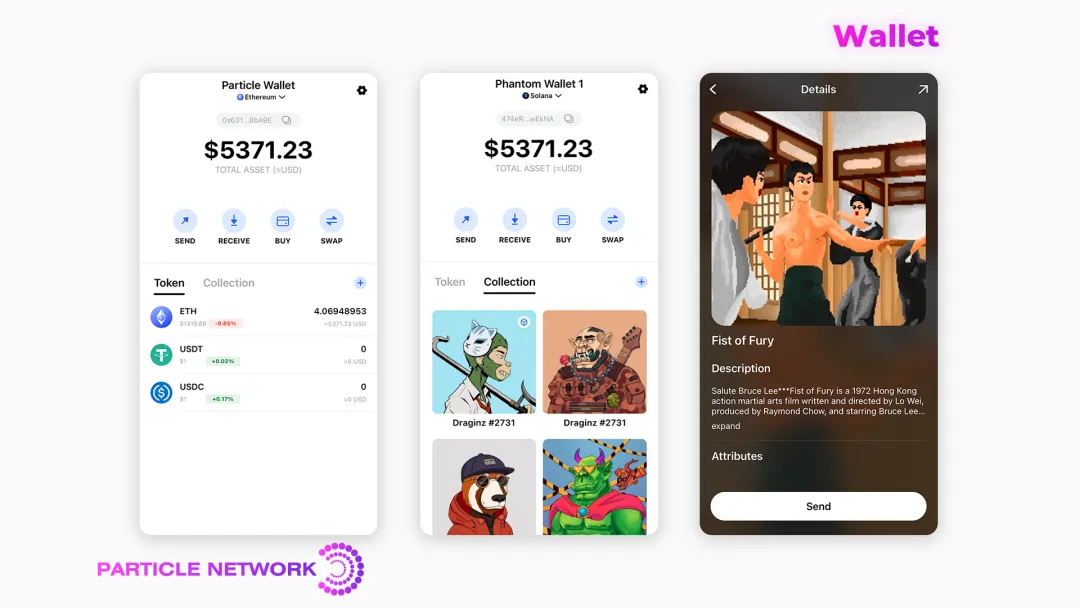
To help users easily enter the Web3 ecosystem, Particle Wallet integrates fiat deposit services, supporting seven different suppliers from 156 countries, covering 36 fiat currencies. Users can easily choose the best exchange rate for purchasing cryptocurrencies without complex operational processes. Particularly noteworthy is the no-KYC deposit service provided by Mercury, which allows users to purchase cryptocurrencies below $700 without cumbersome identity verification, greatly simplifying the deposit process and providing unprecedented convenience for new users.
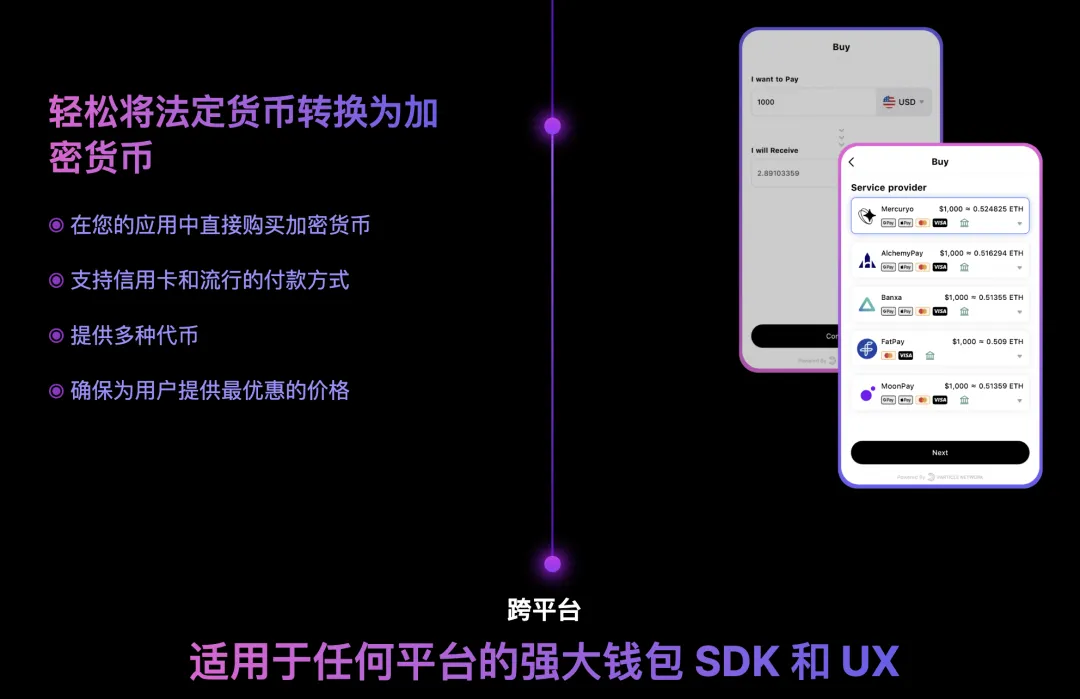
Particle Wallet also integrates multiple decentralized exchanges (DEX), ensuring users can access the best token exchange rates. Partnerships with leading providers such as 1inch guarantee that users can enjoy the latest innovations and deep liquidity in the DeFi space when conducting token exchanges. Developers can leverage industry-leading solutions without creating their own DEX, enabling users to complete token exchanges within the app, promoting user engagement and increasing the overall success rate of DApps.
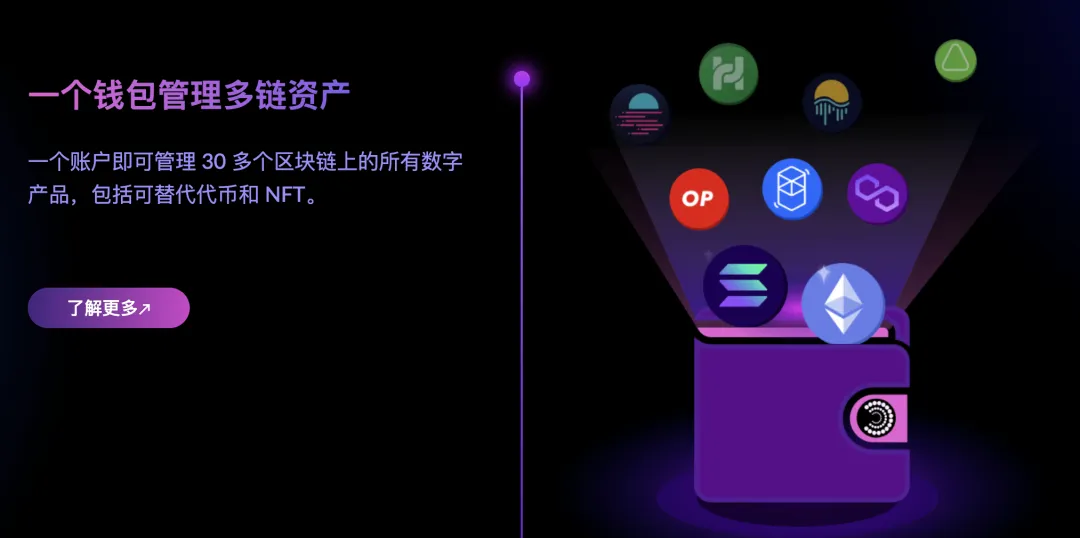
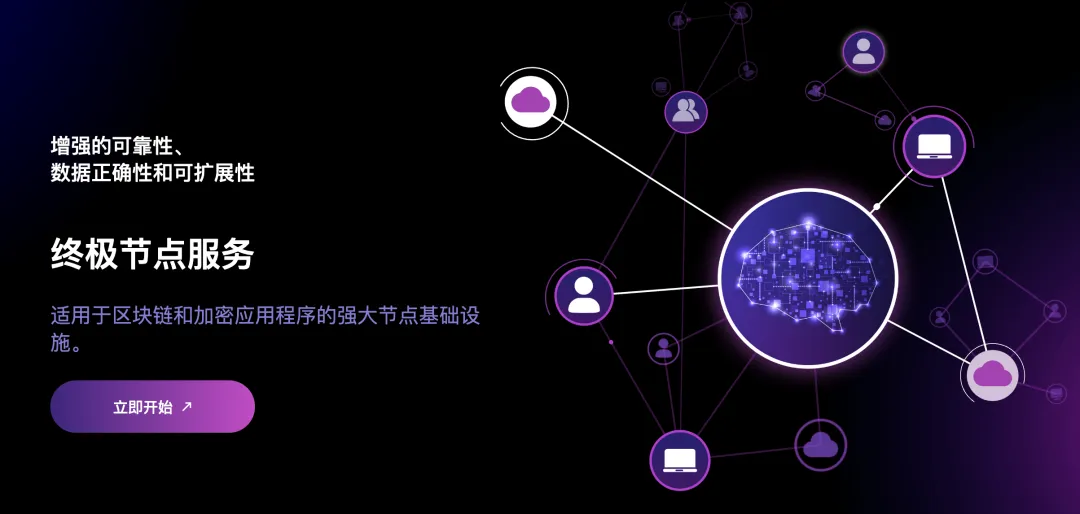
2.3 Node Service
Particle Network's node service is a robust node infrastructure for blockchain and cryptocurrency applications. Developers can utilize the node sharing feature through the Particle Network API to enhance the performance of their projects. Particle Network provides globally distributed node services to ensure the scalability, stability, and security of the ecosystem. This feature operates 24/7, providing support to participants anytime, anywhere. Startups can confidently delegate node management to the platform, allowing them to focus on business development.
Particle Network's node service is highly scalable, dynamically adjusting resources according to demand to ensure the stable operation of the network. This is particularly important for applications that require handling a large number of transactions and high concurrency. Additionally, these nodes support multiple blockchain networks, including all EVM-compatible chains and non-EVM chains such as Solana. This allows developers to flexibly deploy and manage their applications in different blockchain ecosystems. Furthermore, Particle Network's node service provides easy-to-use APIs and SDKs, simplifying the integration process for developers. Developers can easily access node services to perform functions such as data queries, transaction sending, and smart contract calls.
It is worth mentioning that Particle Network's node service operates on a pay-as-you-go model, where developers only pay for the actual resources used, avoiding high upfront investment and long-term maintenance costs. For payments, Particle Network addresses the decentralized nature of gas fees on the chain through its native Paymaster, allowing users to pay gas fees with any token and settle on the Particle Network L1.
2.4 NFT Service
The NFT service is designed for enterprise use and can meet all NFT-related needs.
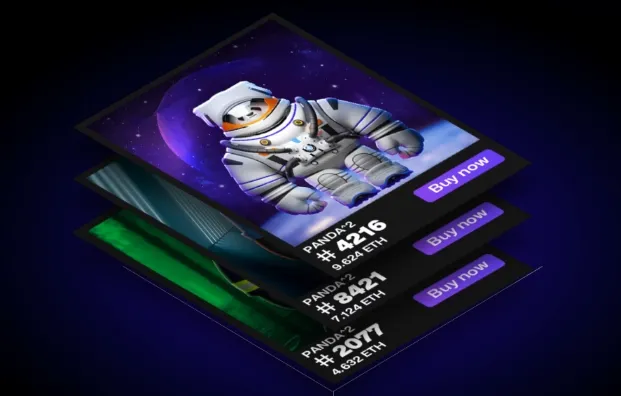
Particle Network provides a simple NFT minting function, allowing developers to create new NFTs through an API and store them on the blockchain. Users can buy and sell NFTs through the Particle Network platform, ensuring the security and efficiency of transactions. Developers can access and query NFT-related data, including ownership and transaction history, through the API, simplifying data management and analysis. Particle Network's NFT service supports cross-chain operations, allowing users to transfer and trade NFTs between different blockchain networks.
With this product, investors can access NFTs based on collections, ownership, creators, and more. Using the API, Particle Network can display all main chains in a simple and unique format. The super data storage system facilitates NFT requests and transaction processes through the original URL, ensuring that buyers receive the full value of their NFT and reducing potential risks during the transaction process.
2.5 Abstract Account
Particle Network introduces an intent-centric design-based abstract account: to improve the user experience by simplifying user operations and enhancing transaction efficiency. The core idea of the abstract account is to lower the entry barriers by changing the way users interact with the network. By simplifying the process of creating and interacting with contracts, users are provided with greater flexibility and a more convenient experience.
The abstract account ecosystem is nearing maturity, including the public chain layer, private key management layer, abstract account stack layer, and application layer. Many well-known projects have adopted abstract accounts to optimize their user experience. However, while abstract accounts have achieved some success in simplifying user operations, they have not fully unleashed their potential, mainly because they still focus on addressing developer needs rather than fully considering user needs.
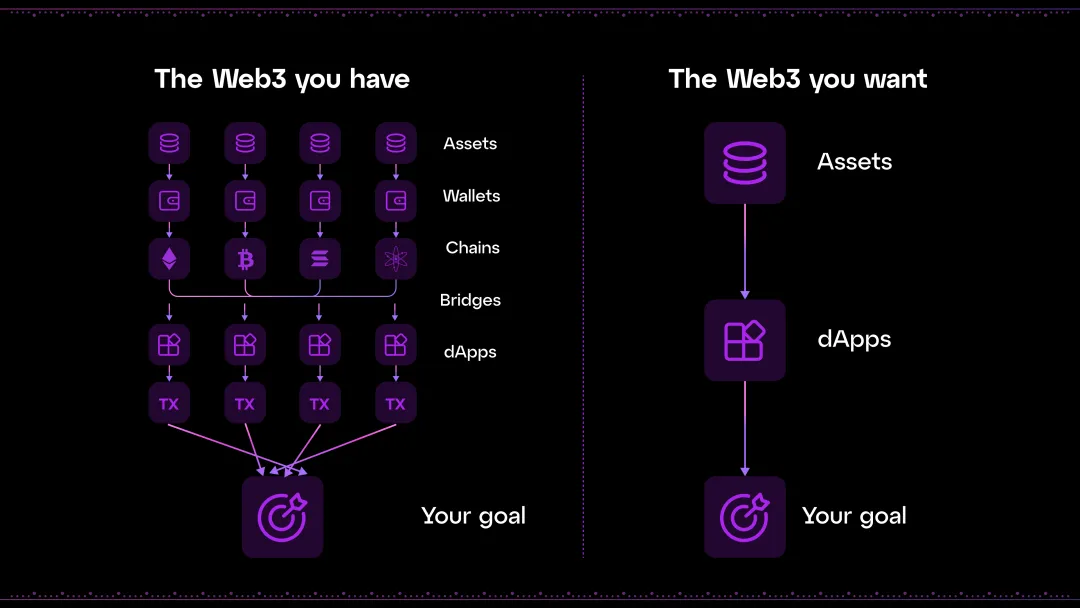
With its V1 product, Particle Network has simplified the process for users to enter Web3 products and improved transaction efficiency through social login and multi-chain signature computation. With the launch of the V2 product, Particle Network introduces the Intent Fusion Protocol, further enhancing the user experience. The Intent Fusion Protocol includes a unified language and framework for expressing intent to the intent transformation layer, a development toolkit for composite demand coordination, and Particle Network's proprietary zkEVM for managing and computing full-chain abstract accounts. This protocol allows users to access application layer products through zero-knowledge login while maintaining privacy.
With this, users can easily deposit ETH into yield products on any L1/L2 and automatically redeem and invest in Lido for risk-free returns once the yield reaches a specific amount. This design prioritizes user needs, ensuring that they achieve real intent with minimal understanding and operational costs.
2.6 Testnet Points Task
In May of this year, Particle Network launched its modular L1 blockchain testnet, aiming to achieve chain abstraction in the multi-chain ecosystem by introducing universal accounts and universal gas functionality. Users can earn $PARTI points by completing testnet tasks, receiving airdrops, and other rewards.
Access Particle Pioneer
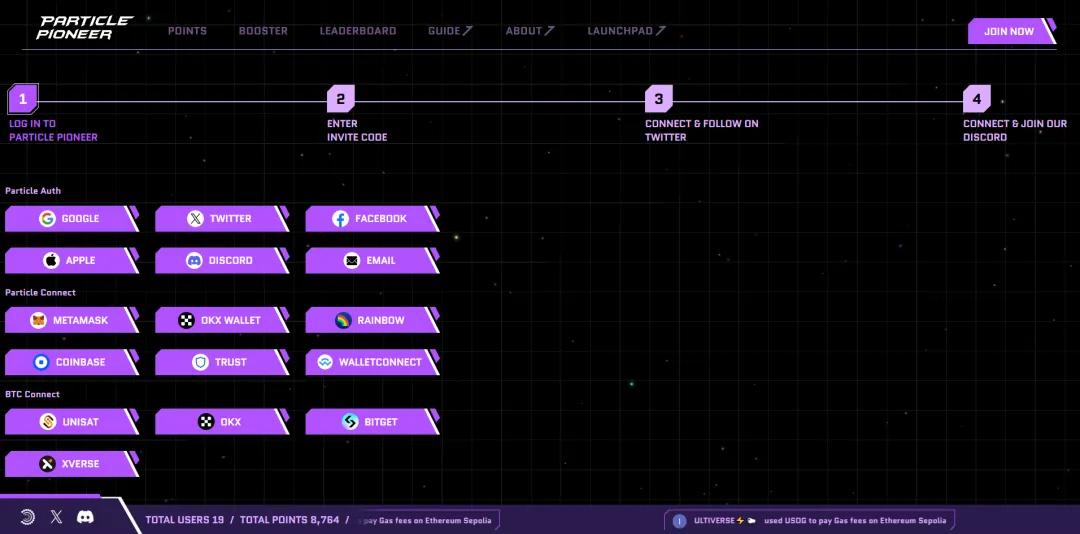
- Access Particle Pioneer and register an account. Users can register through social accounts, Web3 wallets, or native Bitcoin wallets.
Get an Invitation Code
- Invitation codes can be obtained from friends or Particle's official channels (such as Discord and Twitter). After creating an account, connect Twitter and Discord accounts and join Particle's channels.
Deposit Universal Gas
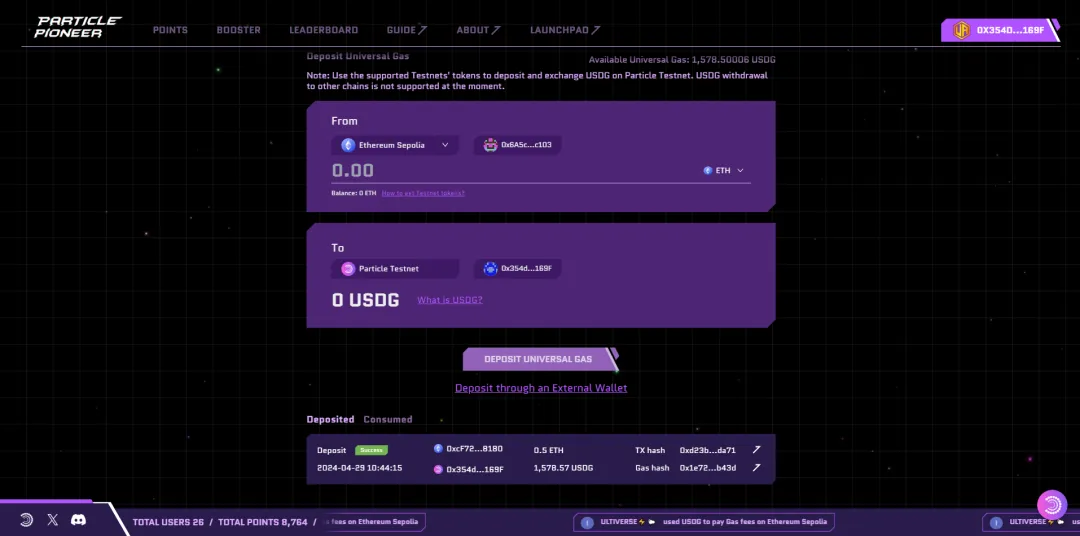
- Deposit native tokens (such as ETH, BNB, BTC) to obtain Universal Gas (USDG), which can be obtained for free through public faucets. The deposited test coins will be automatically converted to USDG, and users can use USDG for transactions on any chain.
Methods to Earn Points
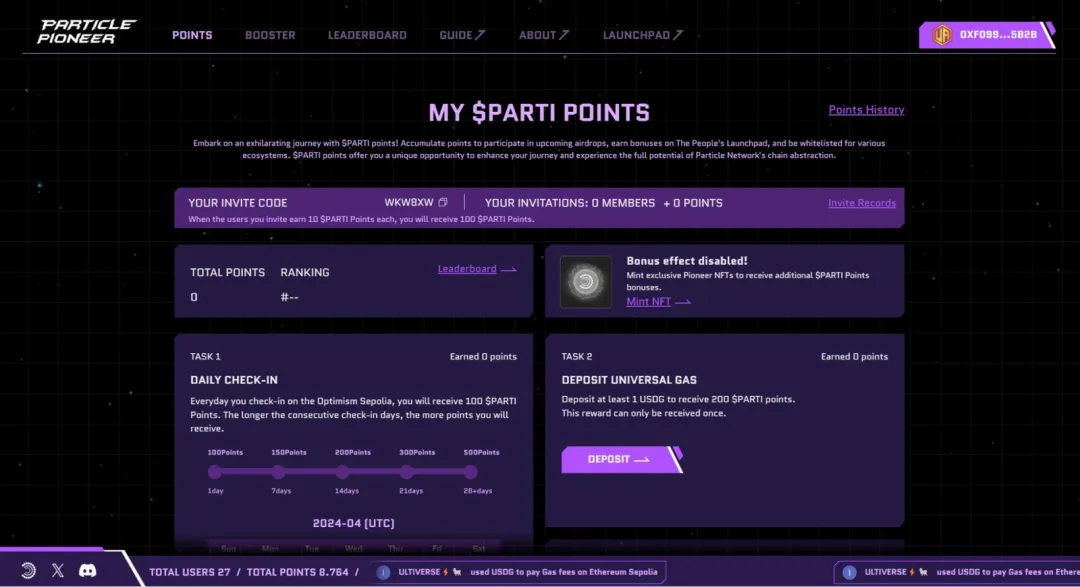
Invite friends to participate in the test.
Daily check-in and send a transaction.
Deposit Universal Gas.
Use Universal Gas for transactions (up to 100 times per day).
Additional Rewards
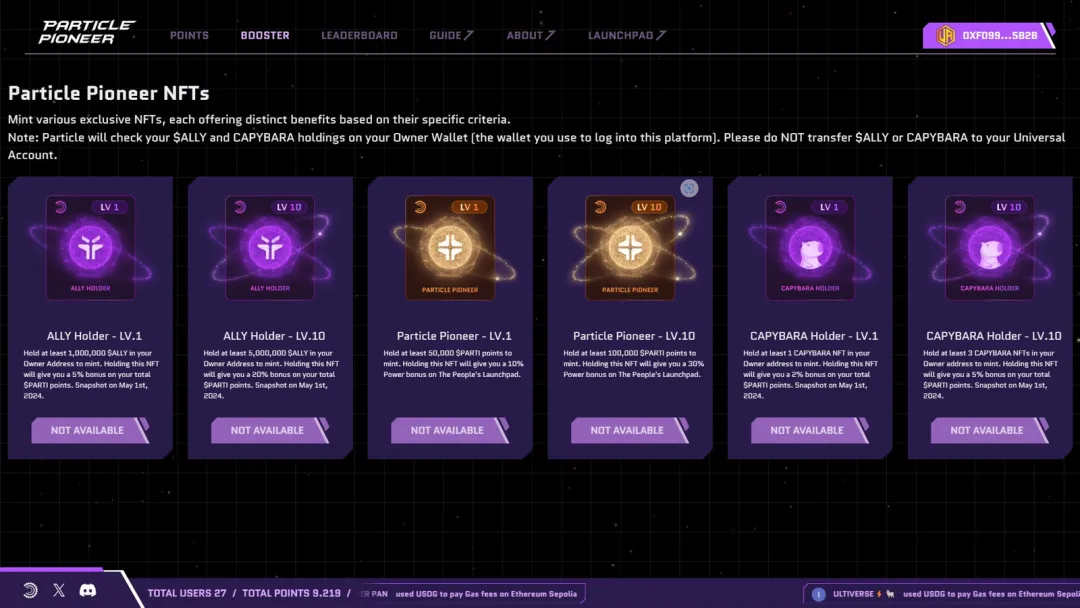
- Holding $ALLY or Capybara NFT can earn additional rewards. These rewards can be obtained on the official market of Peoples Alliance.
3. Team/Financing Situation
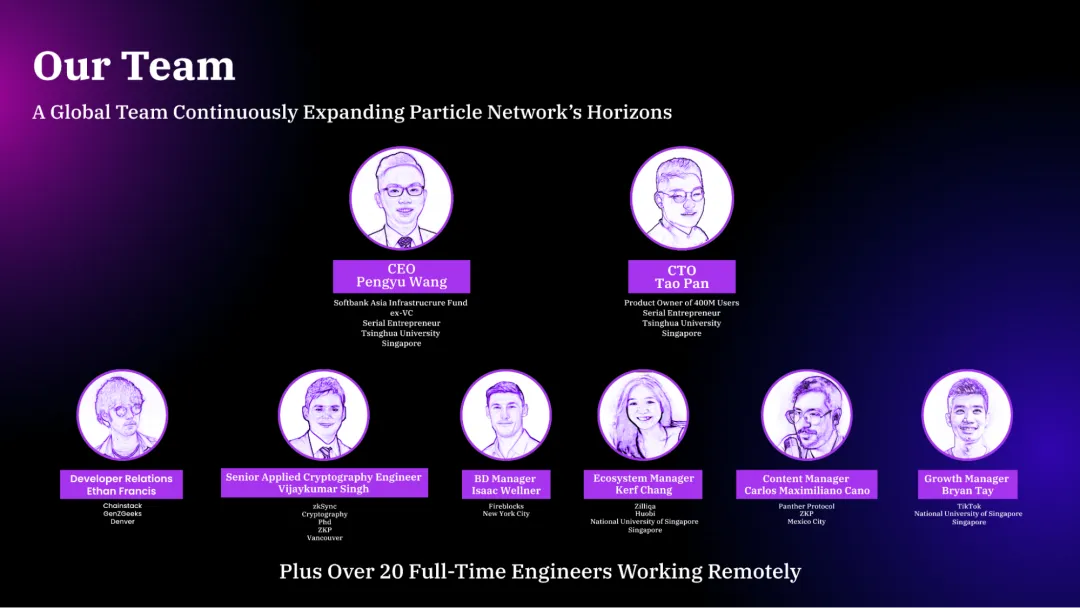
Co-founder and CEO of Particle Network, Wang Pengyu, holds a bachelor's degree from a top Chinese university, Tsinghua University. He previously served as the investment director of SoftBank Saffron Fund, focusing on early-stage startup investments in the Asian region, and was the CEO of MiniJoy.
Another co-founder and CTO, Pan Tao, previously served as the CTO and head of overseas business at Tongzhuo Games, and graduated from Tsinghua University. He established a social gaming platform, Minijoy, and successfully raised $15,000,000 from Alibaba.

Particle Network has successfully completed three rounds of financing. The first round was the seed round completed on May 5, 2022, raising a total of $1,500,000, with participants including Insignia Ventures Partners, CyberConnect, BitCoke Ventures, 7 O'Clock Capital, FSC Ventures, Monad Labs, and others. The second round was completed on March 29, 2023, raising $7,000,000 in seed funding, led by various investment funds such as ABCDE, Animoca, Longhash Ventures, GSR Ventures, and HashKey.
On June 20th of this year, Particle Network completed a $15 million Series A financing round, co-led by Spartan Group and Gumi Cryptos Capital, with participation from SevenX Ventures, Morningstar Ventures, Flow Traders, HashKey Capital, and others. This round of financing was completed through the Future Token Simple Protocol.
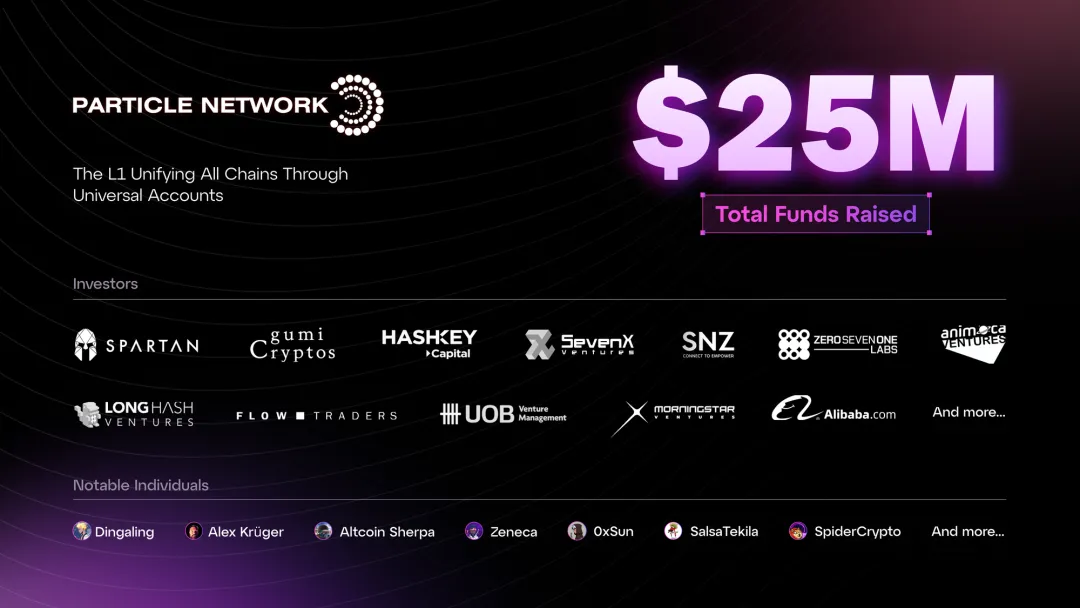
4. Project Evaluation
Particle Network belongs to the blockchain infrastructure and chain abstraction track. The goal of this track is to provide a better user experience and address interoperability issues in the current multi-chain ecosystem by simplifying user interactions with the blockchain.
Projects in the same track include Polkadot, Cosmos, Avalanche, and others. Specifically, Polkadot provides cross-chain interoperability and shared security through a relay chain and parachain architecture, enabling seamless communication between multiple chains. However, its complex architecture and high development costs may pose a certain entry barrier for new projects. Cosmos achieves interoperability between different blockchains through the Inter-Blockchain Communication (IBC) protocol, and its modular architecture allows developers to easily create independent blockchains. Despite emphasizing decentralization, Cosmos' security model relies on the security of individual blockchains, which may pose certain risks.
In comparison, Particle Network's strong technical foundation and market support give it tremendous potential for development. In particular, its modular L1 design and zero-knowledge EVM technology demonstrate its leading position in blockchain technology innovation. Particle Network's efforts to simplify the user experience through universal accounts and universal gas also make it easier for ordinary users to enter and use blockchain technology. Additionally, its strong investment background and partnerships are important guarantees for the success of Particle Network, providing strong support for the project's long-term development.
However, as a relatively new project, Particle Network's ecosystem and developer community have not been fully established. The recommendation here is to seize the opportunity to participate in the testnet, gaining future rewards and an excellent opportunity to participate in the project at an early stage.
免责声明:本文章仅代表作者个人观点,不代表本平台的立场和观点。本文章仅供信息分享,不构成对任何人的任何投资建议。用户与作者之间的任何争议,与本平台无关。如网页中刊载的文章或图片涉及侵权,请提供相关的权利证明和身份证明发送邮件到support@aicoin.com,本平台相关工作人员将会进行核查。




